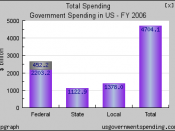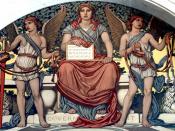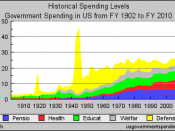Running head: EVALUATING FISCAL POLICY 1 EVALUATING FISCAL POLICY � PAGE \* MERGEFORMAT �8�
Evaluating Fiscal Policy Alternatives Simulation Paper
Name
ECO/372: Macroeconomics
March 21, 2010
instructor
�
Evaluating Fiscal Policy Alternatives Simulation Paper
In the University of Phoenix simulation (2003), Evaluating Fiscal Policy Alternatives, a situation is presented concerning the effects of fiscal policy, "the impact of a change in government spending or taxation on the real Gross Domestic Product (GDP) and aggregate income of the economy" (para. 1) changes in Erehwon. Throughout the simulation scenarios are presented and choices must be made to determine the effectiveness of changes in government spending.
Effects of Fiscal Policy Changes
In making the decisions, special consideration had to be taken because Erehwon's legislation prohibits the budget deficit from increasing beyond five percent.
Scenario One
In the first scenario a decision needed to be made whether to increase or decrease government spending, taxation, or both; as well as the magnitude in the fiscal policy measures to do away with the recession and move the economy to its long-run potential real GDP. Prior to implementing fiscal policy, some of the economic indicators were:
Real GDP - 39.70%
Inflation - 5.00%
Unemployment - 6.32%
Budget deficit - 2.50%
A decision was made to increase government spending $400 million on infrastructure and $300 million on education programs for low-income students, and increase income tax rates 2.50%. The changes resulted in aiding the economy to achieve its potential output while increasing presidential popularity. The policies also led to an increase in real GDP, real income, and inflation, while decreasing unemployment.
While the results indicated that the policy changes were primarily positive, different choices could have led to better results. Increasing expenditures on education was not as critical because it would not generate enough employment for...


